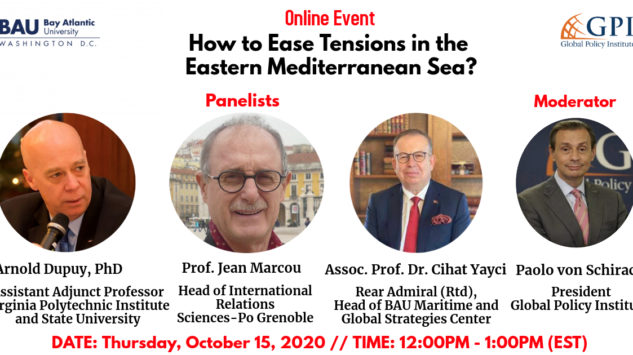Events

How to Ease Tensions in the Eastern Mediterranean Sea
Looking for Common Ground in the East Mediterranean
On October 15 the Global Policy Institute, GPI, and Bay Atlantic University, BAU, convened a panel of international experts in order to discuss and analyze the recent escalation of tensions in the Eastern Mediterranean. The webinar was titled:
“How to Ease Tensions in the Eastern Mediterranean Sea?”
Old, unresolved maritime disputes, mixed with the still pending issue of Cyprus, are now mixed with conflicting claims on large swaths of the Eastern Mediterranean that seem to hold significant natural gas reserves. Turkey, the Greek Cypriots and Greece are directly involved. But so are in different degrees France, Israel, Egypt, Libya and the US. Divergent interpretations of the applicable Law of the Sea, regarding territorial waters and exclusive economic zones, are largely at the source of these disputes.
Is there a way for the parties to become more conciliatory and seek a genuine lasting agreement that may allow the peaceful exploitation of important energy resources for the benefit of all?
Full Video of the Event:
Event Summary:
Yayci presented the Turkish position on the complex issue of conflicting maritime and Exclusive Economic Zones (EEZ) claims, arguing that they are reasonable and based on established international law. He indicated that the maximalist positions held by both Greece and the Greek Cypriots regarding Exclusive Economic Zones are untenable and contrary to established Law of the Sea practice and precedents. He added that the 2019 Turkey-Libya agreement on maritime boundaries between the two states was lawfully reached between the two governments. It establishes clear and mutually agreed upon maritime boundaries between the two states. Marcou highlighted the impact of real and potential natural gas discoveries in the Eastern Mediterranean as an additional element of friction pitting Turkey against Greece and the Greek Cypriots. In theory, significant natural gas finds may provide an incentive to reach agreement among the parties on how to share this important energy source for the benefit of all countries in the region. But this is not happening. Turkey’s positions seem to be dictated in part by its frustration in meeting a strong resistance from all the other parties. Dupuy pointed out that the US is still looking at Turkey through now obsolete Cold War lenses. Washington should understand that Turkey is trying to become a more relevant regional power. Right now, however, Turkey is more isolated, and not on good terms with many of its neighbors. The US should play the role of honest broker. It is the only power that can do this. The best approach would be to begin with a step by step approach via small confidence building measures. For instance, Turkey should be invited to become a member of the Cairo based East Med Gas Forum, EMGF. All the other relevant regional countries are members. Excluding Turkey is of no benefit. That said, it should also be noted that the overall geopolitical relevance of natural gas reserves in the region is not as significant as it would have been a few years ago, given vast amounts of cheap natural gas now available to all buyers due to significant additions to global supplies. Yayci affirmed that Turkey has been and is still today a NATO loyal ally. America should not forget that Turkey is located at the intersection of many regional crises and flashpoints, ranging from Syria to Lebanon, from Iraq to Iran. Turkey is now hosting close to 5 million Syrian refugees. Furthermore, it has played an important role in the stabilization of the Libyan crisis by supporting the legitimate government in Tripoli. Many of the current problems originate from Greece. While the Treaty of Lausanne of 1923 established a three mile limit for Greek territorial waters, Athens thereafter expanded its claims to 6 miles. Furthermore, contrary to clear treaty obligations, Greece militarized Aegean Sea islands it received after the end of WWII. Marcou pointed out that many of Turkey’s positions seem to have been crafted to send a message of strength to Erdogan’s nationalist political allies who want to see a resilient Turkey asserting its rights, even in an unfavorable international scenario. Dupuy argued that many energy related infrastructure initiatives in principle agreed upon by the other regional powers are unrealistic from a simple economic standpoint. Most notably, the undersea gas pipeline potentially linking Israeli and Greek Cypriot gas to Europe is just too expensive given today’s low natural gas prices. Most likely this pipeline will never be built.
Panelists
Rear Admiral (Rtd) Assoc. Prof. Dr. Cihat Yayci, Head of BAU Maritime and Global Strategies Center (Istanbul)
Prof. Jean Marcou, Head of International Relations, Sciences-Po Grenoble
Arnold Dupuy PhD, Assistant Adjunct Professor, Virginia Polytechnic Institute and State University, Adjunct Professor, Bay Atlantic University
Moderator
Paolo von Schirach, President, Global Policy Institute